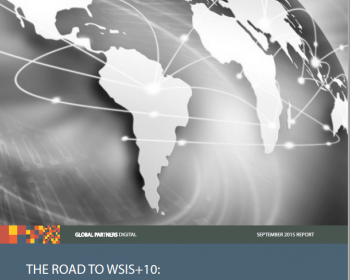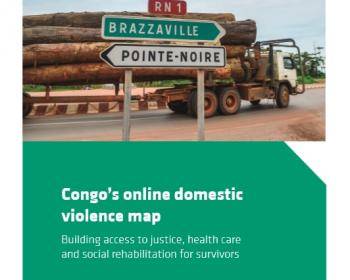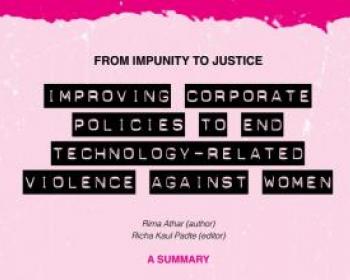Research
What are the world’s governments thinking in the lead-up to the 10-year review of the World Summit on the Information Society? This report aims to inform stakeholder engagement by providing insight into 15 key government perspectives. The country chapter on South Africa was contributed by APC.
This document was originally produced in Spanish February 2004 for the publication The World Summit on the Information Society: A subject for all, produced by the Third Sector Information Network (RITS) and the Heinrich Böll Foundation. The present version offers an update related to the second phase of the WSIS.
In the quest for universal access, this study shows that the cost of network deployment can be dramatically reduced if operators collaborate with each other in deploying fibre optic backbones or masts for wireless broadband. The report points out that even greater savings can be made if other utilities such as roads, rail lines, pipelines and power grids share their infrastructure with network ...
This publication, which is especially useful for women’s rights and ICT for development organisations, UN agencies, health providers, legislators, policy makers and justice enforcement bodies, gathers the learnings and challenges identified by all of the actors involved in APC and AZUR Development’s project “Holding government accountable to gender-based violence in the Republic of Congo�...
Between April 2013 and June 2014, the Association for Progressive Communications (APC) carried out a multi-country research project entitled “Ending violence: Women’s rights and safety online”. The project explored the adequacy and effectiveness of domestic legal remedies and corporate policies/redress mechanisms to address the issue of technology-related violence against women (VAW). &nb...
Did you know that less than half of reported cases of technology-based violence against women (VAW) are investigated by the authorities? Check this infographic to know more about our “From impunity to justice: Exploring corporate and legal remedies for technology-related violence against women” research findings.
The present research seeks to examine the availability and effectiveness of existing domestic legal remedies for survivors of technology-related VAW to access justice and to prevent such violence from occurring. This research was carried out between April 2013 and June 2014 by the Association for Progressive Communications (APC) as part of a multi-country project entitled “Ending violence: Wo...
Did you know that women between 18-30 years old (and younger) are the ones most vulnerable online? And did you know that the majority (40%) of cases are perpetrated by someone known to the survivor? Check out this infographic that draws on the 1126 cases reported on the Take Back the Tech! online map from 2012 to 2014.
This is a summary of the research report “From impunity to justice: Domestic legal remedies for cases of technology-related violence against women”, by the Women’s Legal and Human Rights Bureau. This summary was prepared by Richa Kaul Padte. The present report seeks to examine existing domestic legal remedies for survivors of technology-related violence against women (VAW) to access justi...
This report explores women’s experiences of and demands for corporate accountability in cases of technology-related violence against women as highlighted by the APC seven-country research initiative, “End violence: Women’s rights and safety online”.

Association for Progressive Communications (APC) 2022
Unless otherwise stated, content on the APC website is licensed under Creative Commons Attribution 4.0 International (CC BY 4.0)






